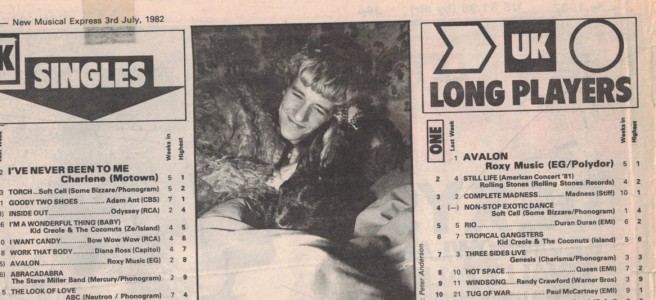Category: Interviews
Our livelihood.
Never Known as a Nonbeliever: Tom Smucker on Disco and The Beach Boys
Interview by Vic Perry
Tom Smucker is a major first-generation rock critic with an unusual career trajectory. By choice never a fulltime critic, he still wrote for The Village Voice, placed an essay in the seminal 1980 edition of The Rolling Stone Illustrated History of Rock and Roll, and broke through the popular vs. academic press wall by publishing a superb book on the Beach Boys in 2018. Smucker appeals to me so much because his arguments are as challenging of critical habits as his tone is friendly. He has sincerely championed the unhip and uncelebrated without ever coming off as if he were just being contrary to get attention. Continue reading “Never Known as a Nonbeliever: Tom Smucker on Disco and The Beach Boys”
Music and Portrait Photographers, Chris Buck & Rick McGinnis
Kandia Crazy Horse: Native Americana from a former rock critic
The Aesthetics of Prince: Interview with C. Liegh McInnis
Critical Storyteller: Interview with Michael A. Gonzales
I’ve been dipping a lot into Michael A. Gonzales’s writing in recent months, particularly his stories about growing up, discovering the music that would carry him through to adulthood, working at record stores, book stores, and coffee shops (working environments I’m all too familiar with). Continue reading “Critical Storyteller: Interview with Michael A. Gonzales”
Turning the tables: Interview with rockcritics.com’s very own Steven Ward
Happy to welcome back (not that he ever really went away) Steven Ward. In the first several years of this site’s run, Steven conducted roughly 80% of the interviews that were posted here, starting with his great 2000 interview with music critic Paul Nelson (the first most fans of Nelson’s work had heard from the man in over a decade), then following through with (only to name a very select few), J.D. Considine, Anthony DeCurtis, Deborah Frost, John Mendelssohn, and dozens more. Continue reading “Turning the tables: Interview with rockcritics.com’s very own Steven Ward”
He’s got the Beats (interview with Simon Warner)
On his frequently updated Substack newsletter, Rock and the Beat Generation, Simon Warner doggedly traces the connections inherent in his title, through interviews and correspondences, reviews, profiles, scrapheap-of-history sidebars. Continue reading “He’s got the Beats (interview with Simon Warner)”
Bangs Radio Interview 1980 (audio version)
In 2001 we posted a transcribed version of a “lost” Lester Bangs interview from 1980 Continue reading “Bangs Radio Interview 1980 (audio version)”
Passing Thru Fire (and Hurricane Annie)
Interview with Jason Gross (Perfect Sound Forever)
Jason Gross is the founder and editor of Perfect Sound Forever, the longest-running internet music publication, with its monthly schedule dating back to 1993 (roughly three years before I even knew what a “web” was). Gross has written for numerous publications over the years (Spin, the Village Voice, Blurt, et al.), produced critically acclaimed CD reissues by Delta 5, Kleenex, and Essential Logic (via the Kill Rock Stars label), and for many years was a panelist and organizer at SXSW, which, like everything else in the entertainment industrial complex, is currently on hold due to COVID. Continue reading “Interview with Jason Gross (Perfect Sound Forever)”
From the Archives: Interview with Matt Resnicoff (2005)
(Originally posted in 2005)
By Steven Ward
Matt Resnicoff crossed a line. The former Musician Senior Editor and Guitar Player and Guitar World writer is now a professional guitarist and record producer. During the e-mail interview below, Resnicoff talks about working for Musician (a magazine he once described as “The New Yorker of music magazines”), and the good and not-so-good aspects of interviewing and writing about musicians. Although he doesn’t miss his music-writing past, he admits it was fun working with such talented people. Continue reading “From the Archives: Interview with Matt Resnicoff (2005)”
Interview with Mark Sinker, Editor of ‘A Hidden Landscape Once a Week,’ a book about the UK music press which any critically-minded person will enjoy lots
Mark Sinker is the editor of A Hidden Landscape Once a Week, a critical history of the UK music press “in the words of those who were there.” Continue reading “Interview with Mark Sinker, Editor of ‘A Hidden Landscape Once a Week,’ a book about the UK music press which any critically-minded person will enjoy lots”
Rock Critic Bill Wyman in Conversation with Chris Buck
Bill Wyman has been a music critic and arts editor for over 30 years but his ranking stories for New York Magazine’s “Vulture” section has recently raised his profile. In these epic pieces, which list every track from worst to best of some of the most important rock acts—the Beatles, Pink Floyd, the Clash and Led Zeppelin—Wyman justifies his rankings, while telling the band’s story. His most recent article of this kind, ranking the Rock and Roll Hall of Fame inductees, is more ambitious still, and becomes almost a history of the rock genre itself, and an argument for its cultural value. Theses stories are a mix of the high-minded, the fantastic, and the silly—in other words, smart and entertaining.
Wyman initially made his name as a music writer at the Chicago Reader in the mid-nineties and then worked as an arts editor at the SF Weekly, Salon, and NPR. His writing has appeared in The New Yorker, The New York Times, The Wall Street Journal, and The Columbia Journalism Review. For more of his story and his writing visit his website Hitsville.net
Normally my interviews are accompanied by a portrait that I’ve taken of the subject, as my primary vocation is photography, but on this occasion that was not possible as we spoke on the phone.
– Chris Buck
Continue reading “Rock Critic Bill Wyman in Conversation with Chris Buck”
Chuck Eddy interview, Oct 2017 (link)
But at the same time, you told me when we talked last week that this is yet another clichéd sentiment, that music was at one time the center of the culture and that the internet has ruined that. You said that things like The Beatles and Michael Jackson and Nirvana were huge exceptions.
I just think — when you mention those names, I think what you’re referring to is how people talk about how there was this monoculture where everybody was in tune to the same music at the same time. I mean, I’ve been hearing about fragmentation ever since I started hearing about music. I cared more about baseball than music through high school. I’m kind of a weirdo in that way, where I didn’t really start buying records, like, constantly, until my freshman year in college. That’s basically when I started reading music criticism and stuff like that.
But ever since I started, I’ve heard people talk about how the music world is becoming more fragmented. Again, that’s something — and I’ve seen criticism from long before then, probably to the late ’60s, that would talk that way.
But, it’s like, if you think about it, in the early ’60s, the same people who bought Kingston Trio albums probably weren’t necessarily buying girl-group albums. You know? I mean, what I really wonder is whether the same people who bought Kingston Trio albums bought early Beach Boys albums because they kinda dressed the same.
They both covered “Sloop John B.” I get the idea that it was two different audiences. That you had a college audience buying the folk revival bands, and suntan high-school frat-boy audience — these are clichés — buying Beach Boy albums, early on. Pre-Pet Sounds or whatever. I’d have to check but I feel like I read once that the biggest selling album of the ’60s was The Sound of Music soundtrack. Lots of people in the wider culture hated The Beatles. They hated their long hair. And it was like news when Leonard Bernstein embraced [them]. And I’m no Beatles expert.
A lot of people hated Michael Jackson! I mean, it wasn’t long after the whole ‘disco sucks’ thing, which I lived through in the late ’70s. I remember when those disco records were set on fire by rock bands [fans?] at the Tigers-White Sox game…
— A sprawling interview (is there any other kind?) with Chuck Eddy at No Don’t Die, a site devoted to video games.















